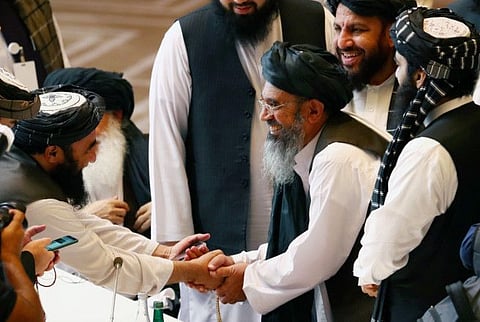Afghan peace talks between government, Taliban begin as Trump eyes US exit
Pompeo: ‘I cannot strongly enough urge you, seize this opportunity’

Doha: Afghanistan’s government and Taliban leaders began historic peace talks Saturday in a bid to end two decades of war, in a meeting that was fraught with tension over what the insurgent group will demand in return for laying down its arms.
Meeting in an enormous hotel conference room in Doha, Qatar, the two sides promised to negotiate in good faith even as questions remain about just how long the talks will last and whether the Taliban will halt attacks that continue to kill dozens of people every day. “We have come to this country to achieve a dignified and lasting peace,” Abdullah Abdullah, chairman of the High Council for National Reconciliation, said at the opening of the conference, in the presence of US Secretary of State Michael Pompeo as more than a dozen foreign ministers attended via video link. “We have come here with good will and good intention to achieve an end to 40 years of bloodshed.”
Abdullah made the government’s priority clear from the start: He called for the talks to achieve a “humanitarian cease-fire,” and cited women’s rights and freedom among the great gains in the 19 years since the fall of the Taliban. Those gains have been threatened as the group steadily regained strength in recent years, and it’s unclear whether the Taliban will be willing to preserve them in any future government.
There is immense pressure on all parties in the talks, with Pompeo indicating American troop levels in Afghanistan would depend on the Taliban upholding its commitments with the US regardless of the outcome of negotiations. US troops levels have dropped steadily from about 13,000 since the Trump administration and Taliban leaders signed their own deal in February.
In his opening remarks in Doha on Saturday, Pompeo said a “durable peace is possible,” and that the US was not seeking to impose its system on others - instead the talks should produce “a political arrangement that accommodates competing views.” He said the US was willing to help if the sides wanted, but stressed the negotiations were an Afghan-led process now.
“I cannot strongly enough urge you, seize this opportunity,” Pompeo said. “Protect this process, respect each other, be patient, remain focused on the mission.”
The North Atlantic Treaty Organisation (Nato), which leads a mission in Afghanistan to train, advise and assist the Afghan security forces, is also urging the two sides to embrace the talks. In a statement released Saturday it urged them to forge an agreement “that puts an end to violence, and builds on the progress of the last 19 years to safeguard the human rights of all Afghans, particularly women, children, and minorities, uphold the rule of law, and ensure that Afghanistan never again serves as a safe haven for terrorists.”
While the developments are a ray of hope for Afghans battered by years of attacks that have killed and maimed tens of thousands of people, the two sides face an uphill task at reaching a consensus. A pact between the US and the Taliban that will result in the withdrawal of majority of American troops has emboldened the insurgent group prompting it to raise the stakes.
The insurgents banned girls education, barred women from public jobs and even punished people for watching television when they ruled the country from 1996 to 2001, citing their interpretation of Islamic rules. Under former President Hamid Karzai’s 14-year leadership, millions of Afghan girls went back to school and many others have held political jobs. That has continued under the current government.
US-Taliban Accord
The talks between President Ashraf Ghani’s administration and the Taliban follow the February US-Taliban accord. The US agreed to withdraw its troops within 14 months, while the militant group pledged to stop attacking American forces and prevent the nation from becoming a safe haven for terrorists.
“We want Afghanistan to have an Islamic system in which all Afghan people live without any discrimination and in harmony with one another in an atmosphere of brotherhood,” Taliban’s leader of the delegation, Mullah Baradar Akhund, who’s also the deputy political chief of the group, said.
Baradar says the group wants “an independent, united and prosperous Afghanistan.”
There’s concern the Taliban may seek to ban education for girls and women, according to Karzai, while other policy makers are worried the Taliban may want to control defence forces.
“We will never accept” any move to abolish women’s education or wind back their hard won gains in politics or business, Karzai said in an interview at his home in Kabul. “I want my daughters to be as educated as the best in the world.”
“I can tell you with confidence that the history of our country will welcome and remember today as the end of the war and suffering of our people,”
The Afghan war, one of the deadliest in the world, has resulted in the deaths of 17,461 civilians, with 32,337 wounded since 2009, when the United Nations began recording the violence. Most casualties are attributed to the Taliban’s ground engagements and suicide attacks, followed by US and Afghan government aerial bombings, the report said.
The fighting has also killed about 2,500 US soldiers and more than 1,000 forces from Nato, according to icasualties.org which tracks their casualties in Afghanistan and Iraq. The death toll for Afghan forces is higher, with Ghani saying last year more than 45,000 soldiers were killed just in the four years since he took office.









